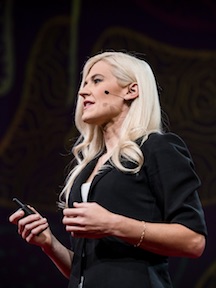By Hoda Fakhari
Microorganisms exist in and on everything around us from our food to our faces, and they serve as the inspiration and driving mechanism behind some of the world’s most common technologies such as blood pressure medications and crop fertilizers. Despite occupying the vast majority of life on earth, the intricate roles of these microbes in maintaining and enhancing the quality of human lives is largely unknown. Microbiologist Anne Madden (ΦBK, Wellesley College, 2006) seeks to change the narrative of microbial appreciation by revealing the overwhelming beauty of these hidden residents. “I really do believe that microorganisms can solve any of our problems if we’re creative enough to find out how,” said Madden. “I think by exploring the microbial biodiversity around us we are taking the next step in making our world a better, healthier, and more sustainable place.”
After exploring poisonous dart frogs and snakes during an undergraduate internship in the rain forests of Costa Rica, Madden returned to her studies at Wellesley with a newfound appreciation for the science of the unknown. “It was working in a soil microbiology lab where I realized I didn’t need to go to the jungle to explore unknown life,” said Madden. “I learned there were unknown microorganisms all around us. I also learned that these microorganisms were not only mysterious, but had the potential to create life-saving medications, better foods, and new building materials. It seemed like science fiction to me that most of our antibiotics come from bacteria in the soil, and that our most successful blood pressure medications came from fungi that can be found in houses.”
Madden is based in the Boston area, but currently works at North Caroline State University as a postdoctoral researcher in Robert Dunn’s lab where she discovers microbial species in insects, food, and the built environment and identifies novel connections between them and everyday technologies. Her research has led to the development of more cost-effective and less risky sour beer brewing technology using yeast found living inside wasps. She has also discovered other yeasts that produce desirable flavors and aromas for use in the food and beverage industries.
As a self-described “oddity in science,” Madden supplements her research in bacterial and fungal communities with engaging talks that make microorganisms known as more than a reason for disinfectant. “As a science communicator, I discovered creativity comes into play every time I’m faced with the challenge of making the invisible world tangible,” said Madden.
Madden has previously spoken on microbial solutions to human problems at TED in Vancouver, and she is set to speak at the Year of X technology conference in Munich, Germany, this April. She is also featured in a newly released documentary called “The Kingdom: How Fungi Made Our World” that uses engaging visuals and compelling science to highlight the role of fungi in the world. More information on Madden’s research and public engagement can be found on her website.
Madden sees her liberal arts education as crucial in the development of her work as a scientist and science communicator: “My liberal arts education fostered my ability to make connections across diverse fields. It furthermore taught me to communicate to (and with) diverse audiences.”
When asked about the role of ΦBK in her career, Madden said, “Being a part of a curious, engaged, and diverse community like ΦBK is important to me. I think it’s more important now than ever before. My ΦBK key hangs on my wall above my desk and reminds me how important it is to support organizations that in turn support the arts and sciences.”
Contrary to the popular belief that the arts and the sciences are disparate fields, Madden believes that embracing both a creative and logical mindset has had the most positive impact on her career. “Sometimes I’m faced with people thinking that pursuing a liberal arts education means one would have to sacrifice a strong science or engineering education,” she said. “This is decidedly not true for me. Going to a liberal arts college did not hurt my chances of becoming a professional scientist, it made me the innovative scientist I am today.”
Hoda Fakhari is a senior at the University of Illinois at Chicago majoring in biochemistry and English. She became a member of Phi Beta Kappa during her junior year. The University of Illinois at Chicago is home to the Iota of Illinois Chapter of Phi Beta Kappa.
Photo credit: Bret Hartman, TED.




